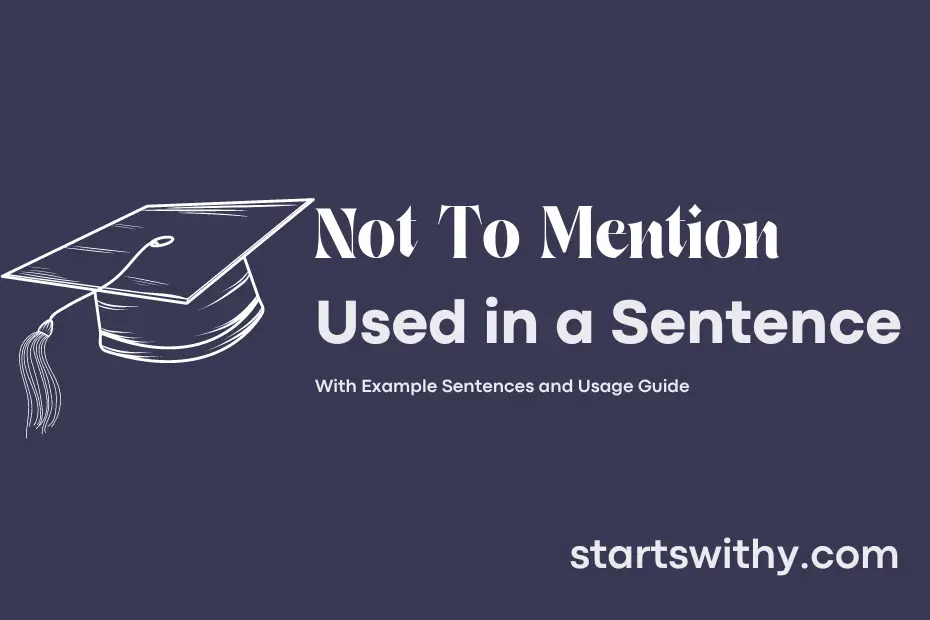Have you ever struggled with connecting ideas in a sentence without using conjunctions like “and” or “but”? This is where the phrase “not to mention” comes in handy. It’s a useful tool to emphasize additional points without repeating the same information or sounding repetitive in a sentence.
“not to mention” is a transitional phrase that serves to introduce further information or points that are related to the topic at hand. It helps to add depth and specificity to a statement, giving the reader a clearer picture of the topic being discussed.
7 Examples Of Not To Mention Used In a Sentence For Kids
- I love to play with my toys, not to mention my colorful building blocks.
- I enjoy watching cartoons on TV, not to mention dancing to music.
- I like to eat fruits and vegetables, not to mention yummy ice cream.
- I have fun running around with my friends, not to mention playing hide and seek.
- I enjoy reading picture books, not to mention drawing with crayons.
- I like to ride my bicycle, not to mention flying a kite at the park.
- I love going to school, not to mention painting in art class.
14 Sentences with Not To Mention Examples
- Not to mention, managing study schedules, extracurricular activities, and social life can be quite challenging for college students.
- As college students, we have to deal with assignment deadlines, exams, and presentations, not to mention part-time jobs and internships.
- Not to mention, the pressure to perform well in academics and secure a good job can be overwhelming for college students.
- Juggling multiple subjects, labs, and practicals can be very stressful for college students, not to mention attending workshops and seminars.
- Not to mention, the struggle to find affordable accommodation and manage monthly expenses can be a major concern for college students.
- Participating in college fests, events, and competitions can be exciting, not to mention the exposure and networking opportunities they offer.
- Not to mention, staying updated with the latest research articles, journals, and trends in your field is crucial for college students.
- Being actively involved in student clubs, societies, and volunteer work can enhance your college experience, not to mention the leadership skills you develop.
- Not to mention, group projects and team assignments often require coordination and effective communication among college students.
- Balancing academics with personal hobbies and interests is important for overall well-being, not to mention taking breaks and practicing self-care.
- Not to mention, seeking guidance from professors, seniors, and career counselors is essential for making informed decisions about your academic and professional journey.
- Building a strong professional network through internships, industry visits, and alumni interactions can open doors to exciting career opportunities for college students, not to mention enhancing your resume.
- Not to mention, the importance of continuous learning, upskilling, and staying updated with industry trends to remain competitive in today’s job market.
- Developing time management skills, setting goals, and prioritizing tasks are essential for college students, not to mention maintaining a healthy work-life balance.
How To Use Not To Mention in Sentences?
Not To Mention can be used in a sentence to add emphasis or provide additional information. It is often used to introduce a point that supports or strengthens the previous statement.
Not To Mention is typically placed at the beginning or middle of a sentence. For example, “I had a busy day at work, not to mention I had to pick up the kids from school and attend a parent-teacher conference.” In this sentence, “not to mention” is used to highlight additional responsibilities the speaker had on top of a busy workday.
Another example could be, “She is an excellent team player, not to mention her exceptional problem-solving skills.” Here, “not to mention” is used to bring attention to the second quality the speaker admires in the person being described.
When using Not To Mention, it is important to ensure that the additional information mentioned is related to the main point being made. This helps to maintain coherence in the sentence and makes the connection between the two points clear to the reader or listener.
In conclusion, Not To Mention is a useful phrase to use when you want to emphasize an added point or provide further details in a sentence. Remember to use it appropriately to enhance the clarity and strength of your statements.
Conclusion
In summary, utilizing sentences with “not to mention” can help to add emphasis, provide further elaboration, or highlight additional points that may have been overlooked. By employing this phrase effectively, one can draw attention to important facts or details that contribute to a clearer understanding of the main topic.
Overall, integrating “not to mention” in your writing can enhance the coherence and clarity of your communication. It serves as a powerful tool to underscore the significance of specific information and ensures that key points are highlighted for the reader’s attention.



